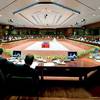Fulfilling the Dream of the United States of Europe
“Doesn’t it thrill you to realize that today it is our job to fulfill the dream of the United States of Europe, the dream of our forefathers amid the ruins of war? Our job –the job of the Erasmus generation – is to tell our children that hope is still alive in the idea of Europe.”
These are the words uttered by Prime Minister Matteo Renzi on July 2nd, when he introduced
the program of the Italian Presidency of the EU Council.
For the remainder of this year, from July 1 to December 31, it is Italy’s job to helm the Presidency of the EU Council. Whether it is more of an honor or a burden may be unclear to the readers of this magazine, as it is indeed to people on both sides of the Atlantic.
Confronting Euro-Skepticism
When I arrived in New York in September 2011 as the newly-appointed Consul General of Italy, Europe was in the throes of a currency crisis that was hitting Greece hard and casting a shadow over Spain, Portugal and even Italy. My American counterparts, especially in the business world, often asked me, “Why don’t you abandon Greece to its fate? Why doesn’t Italy exit from the Euro?” I tried to explain, with modest success, that the process of European integration is irreversible.
A country cannot leave the Euro, and it is unthinkable for Italy to move away from the European Union. The EU is a reality and a fundamental part of the economic, political, and social life of member states. My counterparts listened to me with a mixture of skepticism (toward Europe) and sympathy (for Italy). Their main concern, especially for the Chinese or the Latin Americans, was the financial side of the matter.
After three years of regular contact with Euro-skeptics, American and not, I have come to realize that the most effective way to convey the irreversibility of the European Union is the one chosen by Prime Minister Renzi.
We need to appeal to the role the European communities first, and the European Union later, played in maintaining peace and stability in Europe after the Second World War. We need to remember that, when there were crises and wars, as in the Balkans, the role of the EU, despite the weaknesses of a not yet “common” foreign policy, has been for the most part positive. It is also helpful to mention Europe’s youth, as Prime Minister Renzi does. The Erasmus program, for example, has helped thousands of students to complete their studies in an EU country other than their own. It has helped to create a new generation of young Europeans.
What for my generation was an act of courage and required a comprehensive preparation for months – getting the right travel documents, a different currency, medical coverage, etc. – for the new generation only requires a willingness to learn a new language.
Building the United States of Europe
Perhaps this message is best summed up in the expression “the United States of Europe,” which may also be easier to understand for people on this side of the Atlantic who are proud to be citizens of the United States of America. Obviously the United States of Europe does not yet exist, and the national interest has not yet been completely subsumed by the Union.
The process of European integration is exactly that, a “process” to which all member countries and EU institutions contribute. EU laws and their application in the member states proceed at a rapid pace. The acquis communautaire has become the center of national legislation in almost all areas of economic and social life. A great debate is underway on renewing the role of the EU institutions: the Parliament, the Commission and, of course, the Council of the European Union.
Italy’s Presidency of the EU Council
This brings me to the Italian Presidency of the EU Council. The Presidency is a rotating position assumed by a different member state every six months according to a predetermined order. Italy inherited the scepter from Greece and will pass it to Latvia on December 31. The holder of the presidency is responsible for managing the agenda of the Council, presiding over the majority of its meetings, and representing the Council in relations with the other EU institutions.
These are tasks of great importance, especially today, as the other two major European institutions - the Parliament and the Commission - are both undergoing a process of renewal. Elections to the European Parliament were held on May 22-25, and the new Parliament took office on July 1. On July 15, Jean-Claude Juncker was elected President of the Commission to replace Jose Manuel Barroso. The new commission will take office on November 1, and finally, on November 30, Herman Van Rompuy’s term as President of the European Council will end. These changes leave significant room for the presidency to advance its priorities, in the midst of negotiations to name the right people to leadership positions in the European institutions.
This is also a unique opportunity to counter the Euro-skepticism that so heavily influenced the recent European Parliament elections. Euro-skepticism has had a major impact in Italy. At the same time, however, the Italian Democratic Party was the most voted party in Europe and represents the second largest constituency in the Strasbourg Parliament, as a member of the social-democratic group, which can hardly be considered Euro-skeptic.
These currents of change and renewal make Italy’s responsibility as President of the EU Council even greater, in particular regarding the promotion of consistent sustainable policies on the priority issues of economic growth and migration.
The Europe of the future
The Europe of the future must be more cohesive, supportive and competitive. Its fundamental objective must be the reduction of inequalities. The same features should shape the EU’s foreign policy, starting with migration and asylum policies, through the adoption of more consistent and effective measures to aid countries where migratory flows originate.
Tackling inequality and immigration policies for people who leave their country in search of a better future. The two issues should sound familiar to American ears, which leads us to hope that the EU will no longer be perceived as an unnecessary supranational structure only intended to complicate relations between the United States and European countries.
Europe is indeed a major trade, economic, cultural and political partner with whom to address the many regional and global crises that continue to impact and sometimes compromise the peaceful coexistence of communities and states.






































i-Italy
Facebook
Google+
This work may not be reproduced, in whole or in part, without prior written permission.
Questo lavoro non può essere riprodotto, in tutto o in parte, senza permesso scritto.